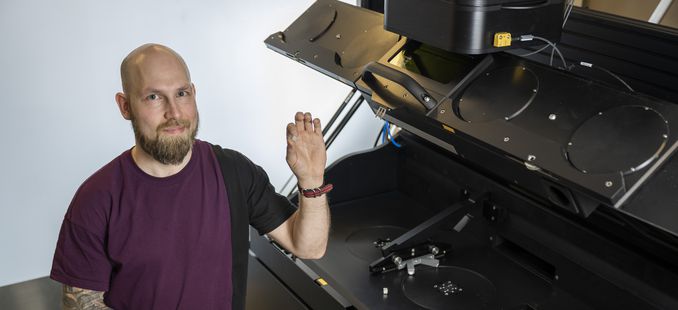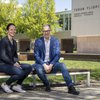
Collaboration in Turku higher education – technology education and research meet the needs of businesses
Tuomas Kantonen, who is doing his Master’s thesis on metal 3D printing, gets to use the latest state-of-the-art equipment thanks to the strong networking and collaboration in technology education and research.
The top-level metal printer is opened in protective gear. Tuomas Kantonen, who is doing his Master’s thesis on Additive Manufacturing for the University of Turku, is carefully cleaning the printed test pieces of dust with a paint brush.
“The idea behind my thesis is to develop the metal 3D printing based on nickel-free steel. It is worth trying to remove nickel from steel, as it is expensive and causes health problems,” Kantonen explains.
The research is still in the early stages. By varying parameters such as the laser power, scanning speed, and powder layer thickness, it is possible to get closer to achieving the goal – a solid material with no gas pockets or cracks.
While working as a psychiatric nurse, Kantonen first studied mechanical engineering at the Turku University of Applied Sciences. After that, he continued his studies at the University of Turku as soon as the Department of Mechanical and Materials Engineering started operating in 2020.
Kantonen, who now works as a research assistant, describes the early research process:
“I started with a test print on a very small base. The biggest problem I have at the moment is that the spreader is too wide, and it spreads the powder unevenly.”
“So first I need to come up with a reducer for the spreader,” Kantonen laughs.
The dark 3D printer the size of two large chest freezers, located deep inside the Machine Technology Center, is one of the latest acquisitions. The Aconity metal printer, which was put into operation last week, is now being tested.
The area’s skills shortage is being solved decisively
In 2018, Turku-based operators rolled up their sleeves to develop an operational environment to better meet the needs of the technology ecosystem and the local businesses. TechCampus Turku was born.
The number of new B.Sc. and M.Sc. students studying at the higher education institutions in Turku has increased to about 1,300 in a few years. A significantly higher number of experts will be graduating in the next few years than three years ago to fill the shortage of technology experts. This was started when the operators in the area began the determined work to develop technology research and education in the Turku region.
Sari Stenvall-Virtanen, Education Manager at the Faculty of Technology at the University of Turku and at TechCampus Turku, explains the starting point for the collaboration:
“The contracting parties of the TechCampus Turku are all the higher education institutions providing technology education in the Turku region: Åbo Akademi University, University of Turku, Turku University of Applied Sciences and Novia University of Applied Sciences. In addition, the City of Turku and Turku Science Park are closely involved in the network.”
The result of this cooperation is a significantly wider supply for the manufacturing industry in the Turku economic area. Bachelor’s and Master’s degree education in Electrical and Automation Engineering, that started in the beginning of 2022 at the Turku University of Applied Sciences and the University of Turku, are examples of the ever-expanding study opportunities.
“The creation of completely new training programs provides a great opportunity to work even more closely together in the development and implementation of education and in the training of future experts,” says Stenvall-Virtanen.
Businesses closely involved in the development work
Cooperation has been significant also in research. The research collaboration between Novia University of Applied Sciences and the leading European maritime research center Fraunhofer is a great example of the benefits of networking. Research and development of autonomous maritime operations in Turku – a city with renowned maritime expertise – is self-evident.
Mikko Helle, Head of Research at TechCampus Turku and Key Account Manager at Åbo Akademi University, talks about the well-functioning business cooperation:
“One good example of Åbo Akademi University’s long-term business cooperation is Neste, with which we have collaborated on several projects over the years. The latest one of these is a large-scale joint project funded by Business Finland to study the production of synthetic aviation fuels from renewable raw materials.
TechCampus Turku is a cooperation network established in 2018 that promotes collaboration between higher education institutions and businesses in the field of technology. Working together creates competence and competitiveness. The contracting parties are University of Turku, Åbo Akademi University, Turku University of Applied Sciences, Novia University of Applied Sciences, City of Turku, and Turku Science Park Ltd.
Machine Technology Center Turku Ltd. is a learning, training and development center focusing on modern technology for enterprises, educational institutes and researchers. The main shareholders are Turku University of Applied Sciences, the City of Turku, University of Turku, Åbo Akademi, Vocational Adult Education Foundation of Turku, and Technology Industries of Finland. In addition, the shareholders include approximately 80 enterprises operating in the region, either directly or through Technology Industries of Finland.
Institutions of higher education in Turku are home to thousands of experts and over 40,000 students. There is a strong tradition of collaboration in research, education and innovation, and the different institutions are located within a shared campus area. Together with city administration, local businesses, the hospital district, and other local operators, institutions of higher education play their part in creating a prosperous, attractive and competitive city for all. Let’s build Turku together!
Text: Misha Dellinger
Photos: Vesa-Matti Väärä
